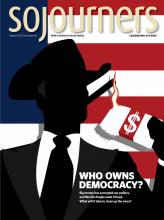LATE LAST YEAR, President Obama made a pilgrimage of sorts to the sleepy town of Osawatomie, Kansas, to talk about the economy. He went there because it’s where, in 1910, Teddy Roosevelt gave one of his most famous speeches, called “The New Nationalism,” which was, in part, an attempt to unite his party around a common vision of a well-managed economy.
Obama’s mission was similar, although more focused on philosophically framing up the 2012 elections. The White House communications staff had built up expectations about the speech, and the president delivered, movingly describing how America can better encourage innovation, shore up the middle class, and expand opportunity. For the most part, the media were aglow.
A few minutes in, he quoted from Roosevelt’s speech: “‘Our country,’” Obama said, “‘means nothing unless it means the triumph of a real democracy ... of an economic system under which each [person] shall be guaranteed the opportunity to show the best that there is in him [or her].’”
But, notice those ellipses. What he omitted was an important phrase from the original quote: “the triumph of popular government.” Five words may not seem like much. Perhaps the president felt as if “real democracy” said enough, or perhaps his speechwriters felt as if it wouldn’t be politically prudent for him to speak so highly of government. But the omission also points to a larger exclusion, not just in Obama’s speech, but in his presidency and, most significantly, in our country’s priorities.
Read the Full Article
